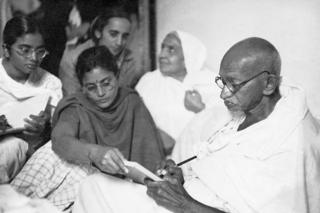- UID
- 20
- Online time
- Hours
- Posts
- Reg time
- 24-8-2017
- Last login
- 1-1-1970
|
|
━━━━━━━━━━━━━━━━━

▼ On the evening of 30 January 1948, Mahatma Gandhi stepped outside the house of an Indian business tycoon in Delhi where he was staying and walked to a prayer meeting in the garden.
Accompanying Gandhi, as usual, were his grand-nieces, Manu and Abha.
As the 78-year-old leader climbed the steps of the prayer platform, a man in khaki emerged from the crowd, pushed aside Manu, pulled out a pistol and pumped three bullets into the frail leader's chest and abdomen.
Gandhi fell, invoked the name of a revered Hindu deity, and died in the arms of the woman who had become his confidante, caregiver and chronicler in his troubled and turbulent final years.
Less than a year earlier - in May 1947 - Gandhi had told Manu with chilling prescience that he wanted her to be a "witness" when his end came.
At just 14, Manu had become one of the youngest prisoners of India's struggle for independence. She joined Gandhi, who had been jailed after his demand to end British rule, and ended up spending nearly a year - between 1943 and 1944 - in prison.
She also began writing a diary.
For the next four years, the teenage prisoner turned into a prolific writer.
Twelve volumes of Manu Gandhi's diaries are preserved in India's archives - written in Gujarati in ruled notebooks, they contain her own writings, Gandhi's speeches (which she wrote as he spoke) and letters, as well as her "English work book".
Now they have been translated into English by Gandhi scholar Tridip Suhrud and published for the first time ever.
Her diary, a constant companion, fell out of her hand when Gandhi collapsed on her after the fatal shooting. After that day, she stopped keeping a journal, and instead, wrote books and delivered talks on the leader until her death in 1969 at the age of 42.
The first set of her diaries offers extraordinary insight into a precocious and observant young girl, both devotee and budding chronicler, keenly recording the everydayness of life in captivity.
She also reveals herself as a tireless caregiver to Gandhi's wife, Kasturba, whose health is failing fast.
Manu's early journal entries reveal what appears to be a joyless and regimented life.
It's a never-ending grind of daily duties - cutting vegetables, preparing food, massaging Kasturba and oiling her hair, spinning thread, reciting prayers, cleaning utensils, weighing herself on selected days and so on.
"But you have to remember, she, along with Gandhi and his wife and associates, are in prison. They have voluntary obligations as prisoners. Life might seem joyless and coercive, but she is also learning the rules of ashramic (a religious retreat or a monastic community) way of life that Gandhi practised," Dr Suhrud told me.
Not formally educated, Manu, under Gandhi's guidance, learns English, grammar, geometry and geography. She begins reading the epics and Hindu scriptures. She finds out "where the War [WW2] is being fought" by looking at a map book. The teenager also reads about Marx and Engels.
Grammar lessons take up a lot of study time. "Today I learnt about declinable (changing) and indeclinable (unchanging) adjectives and about predicative and sub-predicative adjectives," she writes about a lesson.
But prison life with Gandhi and his associates is not entirely desultory.
Manu listens to music on the gramophone, goes out for long walks, plays "ping pong" [table tennis] with Gandhi and carrom with Kasturba, and learns to make chocolate.
She writes of how Gandhi's associates in prison plan to (▪ ▪ ▪)
► Please, continue reading this article here: Source |
|